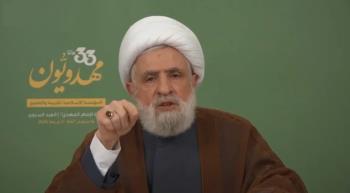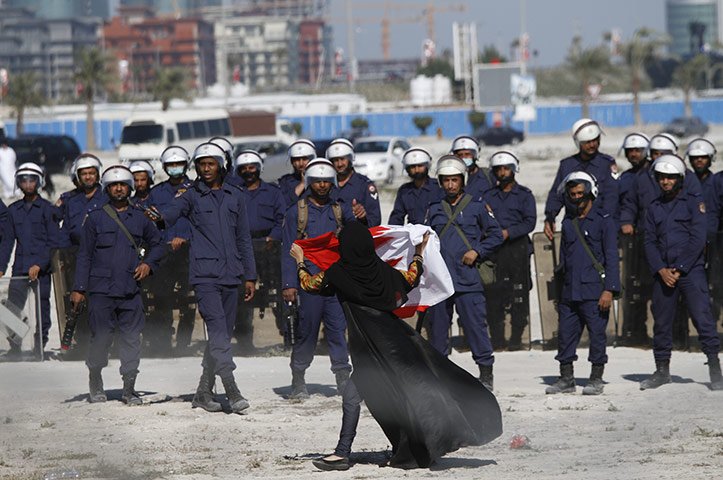Alwaght- Amnesty International (AI) urged Bahraini regime to immediately end its heavy-handed crackdown on peaceful dissent.
The UK-based human rights group released a public statement on Thursday, saying “The Bahraini authorities should halt immediately their heightened crackdown on peaceful critics and opponents”.
IA’s call came after scores of protesters and at least 60 Shiite clerics were summoned and arrested over attending a two-month sit-in in north-west of Bahrain.
Hundreds of Bahrainis have taken part in a nonstop sit-in in Duraz village outside the home of the Shiite’s spiritual leader Sheikh Isa Qassem after ruling regime illogically stripped the prominent cleric of his nationality on 20 June.
According to the rights group, “Four clerics have also been sentenced to between one and two years in prison in relation to the sit-in and nine others remain in detention and are facing trial. Several human rights defenders have also been prevented from travelling outside of Bahrain to take part in human rights advocacy work.”
In response to the protests in Duraz, the Ministry of Interior has closed all roads entering Duraz except two and set up checkpoints at the two remaining roads into the village.
Anyone without ID showing they are residents of Duraz have since been prohibited by the authorities from entering the village, including those who want to visit family there and are not intending to participate in the protest.
Duraz residents told Amnesty International that since 20 June internet access has been blocked every day between 7pm and 1am, the time of day that most people participate in protests.
Scores of protesters and at least 60 Shiite clerics have been summoned for questioning about these protests, some on several occasions, which appears to be a tactic by the Bahraini authorities to intimidate peaceful opponents.
Many of the 60 clerics had signed a statement, published on 19 July and signed by 217 Shiite clerics, demanding an end to being targeted for their “identity”, “beliefs” and “rituals”.
On 16 August, five UN experts described the arrest and targeting of Shiite clerics and human rights defenders and the revocations of nationality as “systematic harassment of the Shia population by the authorities”.
Bahrain, a close ally of the US in the Persian Gulf region, has seen a wave of anti-regime protests since mid-February 2011.
Several rights groups have frequently censured Bahrain for rampant human rights abuses against opposition activists and anti-regime demonstrators.
Scores of people have been killed and hundreds of others wounded or detained amid Manama’s ongoing crackdown on dissent and widespread discrimination against the country’s Shia majority.
How Al Khalifa is Silencing opposition?
Other repressive measures which have been taken by the Bahraini authorities to silence their critics and opponents have intensified in recent months. Leaders of opposition parties either continue to be imprisoned or are currently on trial for peacefully expressing their right to freedom of expression. On 30 May Sheikh Ali Salman, Secretary General of Al-Wefaq, who was serving a sentence of four years for peaceful speeches he made in 2012 and 2014, had his prison sentence more than doubled to nine years in prison after the Court of Appeal reversed his earlier acquittal on the charge of “incitement to the promotion of the change of the political system by force, threats and other illegal means”. Ebrahim Sharif, a former prisoner of conscience and the former Secretary General of the National Democratic Action Society (Wa’ad), was imprisoned in July 2015 and sentenced to one year in prison for a peaceful speech he made a month earlier. He had recently been released after serving four years of a five-year sentence for leading protests during the uprising in 2011. He was released in July 2016 but is facing further imprisonment after the prosecution appealed against the one-year prison sentence and his acquittal on a second charge of “incitement to overthrow the regime by force and illegal means”. His next hearing before the Court of Appeal is on 13 October. Another opposition party leader, Fadhel Abbas Mahdi Mohamed of the Unitary National Democratic Assemblage (al-Wahdawi), remains behind bars after he was sentenced to five years in prison in June 2015 for a statement issued by his party denouncing the Saudi Arabia-led air strikes in Yemen as a violation of international law. Amnesty International considers Sheikh ‘Ali Salman and Fadhel Abbas Mahdi Mohamed to be prisoners of conscience, imprisoned solely for peacefully expressing their views and reiterates its call for their immediate and unconditional release.
At least 316 people, including human rights defenders and former members of parliament, have had their nationality arbitrarily revoked in Bahrain since 2012 on vaguely worded terrorism-related or other security-related grounds.
The majority of the 316 people were effectively rendered stateless, as they have no other nationality. At least six of those who had their nationality revoked have been forcibly expelled from the country since 2014, including two Shiite clerics and a human rights lawyer. Stripping citizens of their nationality without adequate due process protections is arbitrary and in violation of Bahrain’s international human rights obligations.
The right to a nationality and the right not to be arbitrarily deprived of nationality is enshrined in Article 15 of the Universal Declaration of Human Rights and is also reflected in the International Covenant on Civil and Political Rights to which Bahrain is a state party. Article 7 of the 1961 Convention on the Reduction of Statelessness also prohibits, with only a very few very tightly drawn exceptions, any loss of nationality which results in statelessness, and this obligation to avoid statelessness has become part of customary international law.
Following is the story of some Bahraini clerics and human rights activists, who are serving in Bahraini prisons, reported by Amnesty International.
Sheikh Maytham al-Salman, a cleric and a human rights defender, was arrested on 14 August and interrogated about, among other topics, his human rights work and the protests in Duraz; he was charged with “illegal gathering” and released the following day. During his interrogation, he was reportedly denied the right to have a lawyer present, deprived of sleep for 26 hours and forced to remove his turban. It is unclear if the case will proceed to trial. Sheikh Maytham al-Salman has been awaiting a new passport since January 2016, and during that time has effectively been banned from travel. Sheikh Maytham al-Salman has not been provided with a reason for the delay despite at least nine requests for information on the progress of his application. Amnesty International also wrote to the Ministry of Interior in March 2016 about the case and did not receive a response.
Dr Taha al-Derazi, a neurosurgeon and member of the NGO Bahrain Human Rights Monitor, was summoned on 14 August alongside Sheikh Maytham al-Salman and 11 other men, several of whom were clerics, and five women. He was charged with “illegal gathering” and released on 24 August, pending trial. His trial is ongoing and the next court hearing is on 6 September. On 10 June, Dr Taha al-Derazi and his wife were prevented from leaving Bahrain to travel abroad, although they were told that no official travel ban had been imposed.
Khalil al-Marzooq, Assistant Secretary General of the largest opposition group in Bahrain, Al-Wefaq National Islamic Society, was summoned with 13 others including eight clerics, on 7 August and accused of participating in the sit-in in Duraz, which he denied. He was released that day after he had signed a document stating that he would not participate in any gathering.
Sheikh Isa Qassem, who is the spiritual leader of Al-Wefaq, was charged On 17 July alongside two employees in his office with “money laundering” and “receiving funds without authorization” in connection with his receipt of khums, a religious obligation for Shi’a Muslims to donate a fifth of their yearly profits to their spiritual leader or his representative, who receives the money and distributes it to the poor, a practice that has been conducted by the Shi’a community in Bahrain for centuries. His trial opened before the High Criminal Court in Manama on 26 July, and his next hearing is on 15 September. Sheikh Isa Qassem has not appointed a lawyer or appeared in court.
Two days after Sheikh Isa Qassem was charged, Al-Wefaq was dissolved, in an unprecedented escalation of the authorities’ repression of the association. The dissolution and the seizing of all its assets was ordered by a court of appeal following a lawsuit brought by the Ministry of Justice. The Bahraini authorities presented no credible evidence to show that Al-Wefaq is anything but a peaceful opposition movement, and Amnesty International considers Al-Wefaq’s dissolution to be a violation of the right to freedom of expression and association of its members.
The Bahraini authorities have also intensified their clampdown on human rights defenders and civil society more generally since June 2016. Since June, 24 individuals, including human rights defenders, former prisoners of conscience, a lawyer and a journalist, have received official travel bans or been prevented from travelling abroad to participate in human rights advocacy visits or go on holiday with their families. In a move identical to what happened to five activists in the days leading up to the UN Human Rights Council session in Geneva in June, Nedal al-Salman, a human rights defender, was stopped on 29 August at Bahrain International Airport and prevented from travelling to take part in advocacy meetings in Geneva, ahead of the UN Human Rights Council session in September. She was informed by the official who stopped her at the airport that a travel ban had been imposed on her by the public prosecution.
Nabeel Rajab, a prominent human rights defender and president of the Bahrain Centre for Human Rights, was arrested on 13 June and is currently detained and facing trial for making and posting peaceful comments on Twitter relating to allegations of torture in Jaw Prison in March 2015 and to the war in Yemen. His next court hearing is on 5 September. Nabeel Rajab has been in and out of prison since 2012 because of his human rights work and has been subjected to a travel ban since November 2014. Amnesty International considers Nabeel Rajab to be a prisoner of conscience and calls for his immediate and unconditional release.
Ghada Jamsheer, a human rights defender working on women’s rights, was arrested at Bahrain International Airport on 15 August after returning home to Bahrain and taken into custody. It is not known why she was arrested but her detention may be related to peaceful comments she posted on Twitter in 2014 about alleged corruption at King Hamad University Hospital. In June 2016, a court of appeal upheld a one-year prison sentence previously imposed on her after she was convicted of four separate charges related to those comments on Twitter. If Ghada Jamsheer’s detention is related to this prison sentence or other charges connected to her peacefully exercising her right to freedom of expression, Amnesty International would consider her a prisoner of conscience.



























